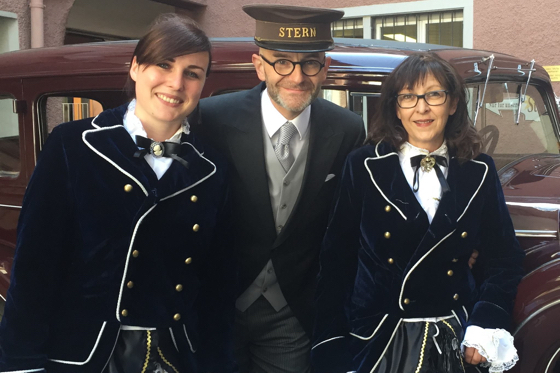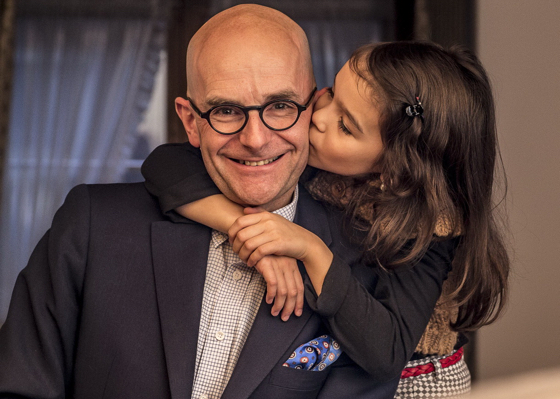Small and medium-sized hotels in Switzerland are having to adapt to new market realities. The euro has fallen so much against the Swiss franc, making Switzerland – already an expensive destination – more expensive. The traditional markets are the European markets. But these markets have shrunk now.
Good chefs are being lost to private hospitals or high-end supermarket chains, to name a few labor force competitors, while service staff are baulking at split shifts. Even the lunch menu has to be reviewed, as young business executives prefer quicker lunch breaks so they can leave work earlier.
HOTELS spoke to Adrian Mueller, president of Romantik Hotels and Restaurants Switzerland, which comprises small and medium-sized establishments that pledge the romance of traditional, authentic Swiss hospitality. He is also director, Romantik Hotels and Restaurants International, and owner/operator of the 65-room Romantik Hotel Stern, a renovated 360-year-old hotel in his hometown, Chur, Graubünden, which he bought 10 years ago after a long career stint in Asia, including as general manager of The Shangri-La, Bangkok.
HOTELS: What are the biggest challenges in staying ‘Romantik?’ For example, is it difficult preserving authentic Swiss hospitality?
Adrian Mueller: It has become more and more difficult to find qualified staff, especially cooks. We lose them to private hospitals and high-end supermarket chains, for example, where the working hours are shorter.
Another big headache today is the split shift for staff. Not many people want to do split shifts anymore as it takes more or less their entire day. What do you do with a three-hour break in the afternoon when all your friends are working?
Most of my colleagues are also small and mid-sized companies; we can hardly offer shifts without a break in between. The main business in a restaurant, for example, is 12 p.m. to 2 p.m. and 7 p.m. to 9 p.m., and the rest is shoulder time. I have not found yet the perfect solution but I am on it.

H: The workers’ attitude seems to have changed.
AM: What we notice is that the majority of young people are not prepared anymore to put in the hours required – meaning it is important for them to be done with work at 6 p.m., with Saturdays and Sundays off. That is exactly our challenge.
H: What can be done?
AM: Firstly, we need to have a high degree of flexibility with some part-time staff who only work, say, Tuesdays and Saturdays after 5 p.m. You need a larger pool of part-timers to honor these hours, and only then will it work. What’s essential, too, is a good mix of properly trained and motivated full-time and part-time professionals.
What the labor market also offers now are more and more people who do not want to work full-time. So this is our chance: If I can find a restaurant waitress who is interested in working only 50%, for example, I could schedule her five times a week from 11 a.m. to 2 p.m. But it’s still a long way to go.
Secondly, we need to notice people’s potential. For example, we had a fantastic waitress some seven years ago. I noticed her potential to rise in the hotel. We trained her up and finally last year she became our front office manager. These are fantastic win-win situations and generate great loyalty both ways.
H: How is the strong franc impacting Swiss hotels?
AM: While central Switzerland and the areas of Interlaken/Jungfraujoch and Zermatt are doing very well, other areas are not performing so well. Reason being that the first mentioned have worked the long-distance markets for many years and enjoy now a steady growth year on year.
Areas like Graubünden, St. Moritz, Chur and Davos, due to their geographical positions, have always had a strong standing in the European markets – mainly Germany, Benelux and the UK. Unfortunately these are markets that reacted to the currency drop of the euro very sensitively and strongly. In Graubünden we talk about a drop over the past four years of between 12% and 18% depending on the hotel and location within the area.
H: What is Romantik doing about it?
AM: It’s been quite a struggle for independent hotels to keep up with the ever-changing technological development, so on the one hand we are improving the IT (website, SEO and distribution channels) for our members. It is also important to cluster hotels into experiences such as city hotels, seaside hotels, mountain hotels, etc. Once we have completed this, we will have a much stronger position while talking to the OTAs.
We must further improve our performance as only solid numbers will encourage new hotels to join us, and for that purpose we have hired a brilliant IT specialist to head that department and invested in a new business development team to enlarge our footprint.
Switzerland still has many areas where we would like to see Romantik hotels, too.
The Swiss board comprises seven highly motivated individuals, all hotel owners, so we know what needs to be done and we want it done fast.
H: As a hotel owner yourself, and one with Asian roots, are you tapping the Asian market to make up for the loss of traditional markets?
AM: Absolutely. For Graubünden, it is important that we start working Asia, too. Chur is Switzerland’s oldest city and the starting point for the Berinan Express (train ride to Italy) and the Glacier Express from Chur to Zermatt.
But we cannot compete with the economically run tour groups.
Our goal is to excite the repeaters out of those markets to visit other parts of Switzerland as FITs. We are seeing a steady increase in the number of such clients, albeit not in big numbers yet, and want to capitalize on this segment. I was excited to be part of the Swiss Travel Mart (September 22-23, Zermatt) for the first this year. We had a good number of very interesting appointments with Asian buyers.
H: As someone with Asian ties, I thought you would have tapped the market sooner.
AM: With a year-round occupancy of over 80%, frankly we had our hands full. I always knew it was risky to put all of our eggs in one basket. But who would have thought that the euro would be dropping by so much so quickly.
H: How are you prepared to cater for Asian business?
AM: We can cater to individual Asian guests predominantly in the areas of food and, for the younger generation, services like free Wi-Fi. The hardware is ready (the hotel is fully renovated); in the longt-erm, we need to work on the software, for example, translating guest information into Chinese, Japanese and Thai. With my 14 years of experience in Asia I will be able to train my staff and make them aware of the likes and dislikes of our guests from the Far East.

H: What about the North American market, which seems to be coming back to Switzerland?
AM: Indeed, Switzerland overall is seeing a return and growing numbers from the Americas. But not yet for us in Chur and much as we’d like to tap it, we simply do not have the resources to be active in all markets.
H: What do you count as your biggest achievements with Stern since you bought it?
AM: That my staff is being recognized on their day off. Recently, one was in a train to Zürich and got approached by guests who told her how fantastic the dinner was the other day. Strangers in Chur also ask them where they can have good food. I am blessed to have a fantastic team around me who are as passionate and committed as I am.
H: What are your goals for the next 5-10 years?
AM: To continue to develop the Stern – be flexible, recognize changes and respond to them in a positive way. This will keep us appealing to a younger market.
Ultimately, I would be delighted if one of my three children would one day join the business – but this is a long 15 years away.

